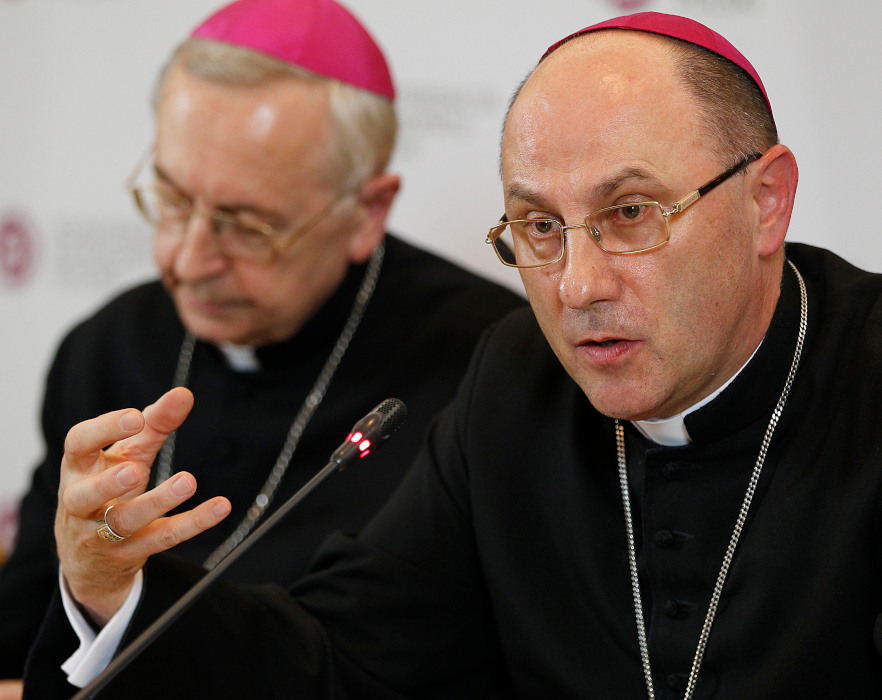
In this file photo taken on March 14, 2019, Archbishop Wojciech Polak, right, the Roman Catholic primate of Poland, addresses the media during a news conference at the episcopate building in Warsaw. Pope Francis has named a temporary administrator to lead a southern Polish diocese where the bishop has been accused of covering up cases of sexual abuse that were featured in a second abuse documentary that has rocked Poland's Catholic Church. (AP/Czarek Sokolowski)
Pope Francis has ordered a Polish bishop to leave his central diocese and let someone else run it while he is under investigation for covering up cases of sexual abuse that were featured in a second clergy abuse documentary that has rocked Poland's Catholic Church.
Francis on June 25 named the archbishop of Lodz, Grzegorz Rys, to temporarily take over as head of the Kalisz diocese.
The Vatican's ambassador, in explaining the decision, said the current Kalisz bishop, Edward Janiak, 67, retains the title of Kalish bishop for the time being. But the explanation, posted late June 25 on the Polish bishops conference website, said Janiak must leave the territory of the diocese and can't have any form of influence on how it is run.
In May, the online documentary "Playing Hide and Seek," exposed two cases of pedophile priests that Janiak handled, first as an auxiliary bishop of Wroclaw and then as bishop of Kalisz, which he has headed since 2012.
It featured court testimony about Janiak's role helping transfer one priest, subsequently convicted and defrocked, from Wroclaw to another diocese even after a criminal investigation had begun. The film also documented another case of alleged cover-up of another priest during Janiak's time as Kalisz bishop.
The film suggests Janiak didn't follow the Vatican's own in-house rules to report allegations against the Kalisz priest to the Holy See, and did so only after the case gained media attention. The diocese maintains no actual victims had lodged a formal complaint, though the parents of one victim did. An audiotape of their 2016 meeting, in which Janiak berates the parents, provides one of the more chilling moments of the documentary.
The film was the second on Polish clergy abuse by brothers Tomasz and Marek Sekielski, after their first one last year, "Tell No One," triggered a national reckoning in a country where there is no higher moral authority than the Catholic Church and its clergy. That film elicited an apology from Archbishop Wojciech Polak, the Primate of Poland, and prompted at least one cleric to leave priestly life.
Polak in May wrote to the Vatican reporting the allegations against Janiak and asking for an investigation into them. Poznan Archbishop Stanislaw Gadecki was tasked with carrying out a preliminary investigation. He has said he wouldn't comment while it is underway.
Later in May, Kalisz's leading priests were asked by a local bishop to sign a letter to the Vatican pledging confidence in Janiak. But most refused and instead sent a letter asking for Vatican clarification into the allegations against him, Catholic magazine Wiez said.
Such a display of priests disobeying their bishop is unusual in the Catholic hierarchy, particularly in conservative Poland, and suggests that the level of public outcry over sex abuse is growing and changing attitudes inside the church.
In early June, Janiak was hospitalized with the suspicion he had suffered a stroke. Further examination showed he was just heavily drunk.
Both Sekielski films carry English subtitles and are available on YouTube. As of June 25, "Tell No One," had registered 23.8 million views; "Playing Hide and Seek" registered 7.3 million views since its premiere May 16.
Advertisement







